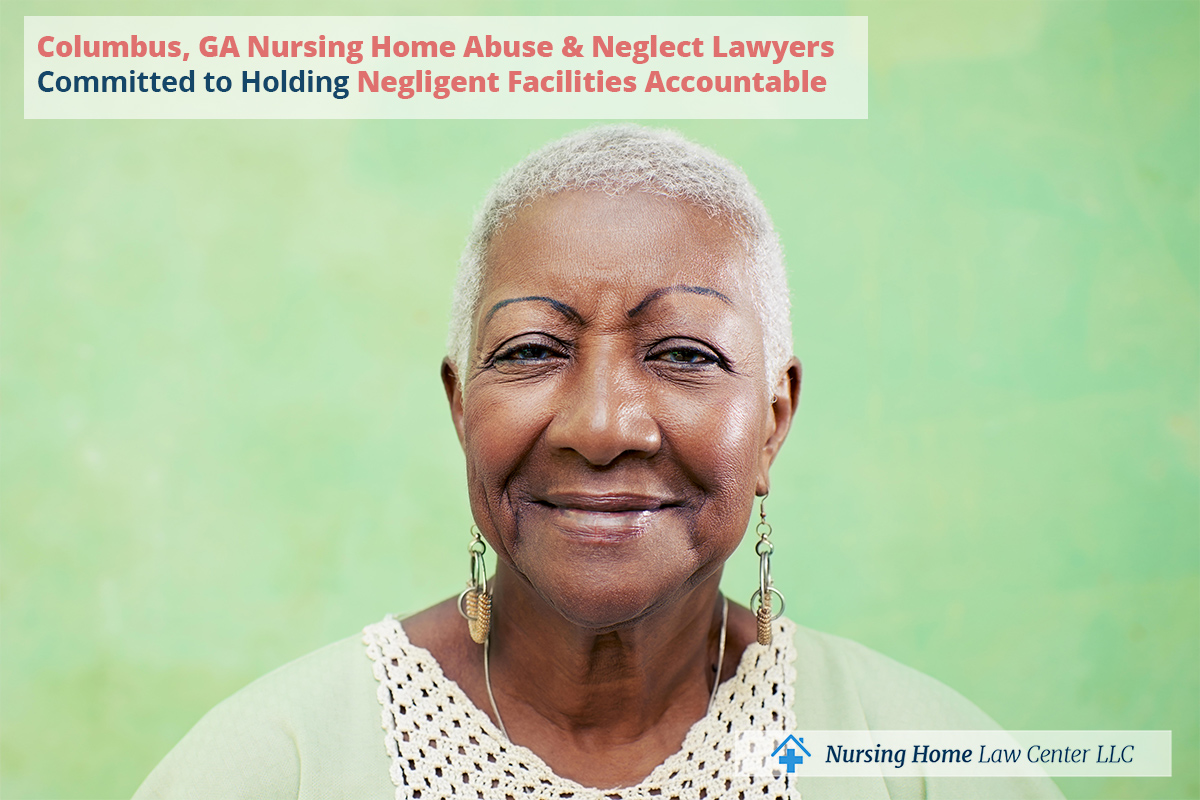legal resources necessary to hold negligent facilities accountable.
Columbus Nursing Home Abuse Lawyer
In nursing homes, abuse and neglect can have dire consequences, resulting in severe harm or even death for elderly patients. This maltreatment often stems from issues such as understaffing, inadequate training, and systemic neglect within these facilities.
Nursing Home Law Center, LLC is committed to helping victims of such abuse, offering guidance and legal resources. Our experienced nursing home abuse lawyers are skilled in advocating for the rights and well-being of the elderly, ensuring they receive the justice they deserve.
 Advocating for Justice and Care in Columbus Nursing Homes
Advocating for Justice and Care in Columbus Nursing HomesIn Columbus, the rise of nursing home facilities parallels a growing concern for the welfare of elderly patients. As Columbus Nursing Home Abuse Lawyers, we champion the cause of safeguarding our elderly from abuse and neglect. This advocacy is not just about legal representation; it's a commitment to ensuring the dignity and rights of Columbus’s elderly are fiercely protected.
The increasing instances of nursing home negligence and abuse in Columbus require a dedicated legal approach. Our specialized nursing home abuse lawyer team is committed to providing comprehensive legal support to affected families. We understand the unique challenges the elderly face in nursing facilities and strive to ensure they receive the care and respect they deserve.
Nursing home abuse, a sadly prevalent issue, is often characterized by a lack of basic human decency and respect. Our nursing home neglect lawyer team is ready to confront these injustices, ensuring that Ohio nursing homes adhere to ethical and legal standards. We are dedicated to transforming these care facilities into safe havens for our elderly residents.
 Nursing Home Statistics
Nursing Home StatisticsIn January 2024, the Centers for Medicare and Medicaid Services (CMS) released updated statistics regarding nursing homes in the Columbus, Ohio, area. According to CMS data, out of the 77 nursing facilities in this area, a significant number, 37 of them, which is approximately 47%, were rated as "below average" or "much below average."
Nursing Homes Cited for AbuseIn addition to these below-average ratings, several nursing homes in Columbus, Ohio, have been cited for instances of abuse and neglect. These findings raise significant concerns about the well-being of nursing home residents. The following nursing facilities have been identified by inspectors for abuse:
- Arbors at Carroll
- Embassy of Winchester
- Embassy of Woodview
- Majestic Care of Whitehall
These statistics underscore the need for vigilant oversight and advocacy for residents and their families.
 Why Government Agencies Survey and Inspect Nursing Homes
Why Government Agencies Survey and Inspect Nursing HomesGovernment agencies, including the Ohio Department of Health, CMS, and other regulatory bodies, conduct surveys, inspections, and investigations into nursing homes for several reasons. The primary focus is to ensure the safety and well-being of nursing home residents.
- Identifying Negligence and Abuse: These agencies are dedicated to identifying cases of negligence and abuse, whether it's physical abuse, verbal abuse, emotional distress, or neglect of the elderly loved ones in these facilities.
- Protecting Vulnerable Individuals: Residents are often vulnerable and may suffer serious injuries, including pressure ulcers, broken bones, head injuries, or even sexual assault if proper care is not provided.
- Filing Complaints: Patients or their family members can file formal complaints with these agencies if they suspect abuse or neglect in nursing facilities. Government agencies take these complaints seriously and initiate investigations to protect residents.
- Preventing Further Abuse: Government oversight helps prevent further mistreatment and physical harm and ensures that caregiving homes comply with regulations and provide adequate care. This includes addressing issues such as isolating seniors, financial abuse, and the spread of diseases.
- Obtaining Compensation: In cases of severe injury or wrongful death due to negligence or abuse, family members may pursue a nursing facility abuse claim, personal injury lawsuit, or wrongful death claim. Experienced Columbus nursing home abuse lawyers can help victims and their families obtain compensation through legal action.
If you suspect that a loved one has suffered from nursing home neglect and abuse in Columbus, Ohio, it's crucial to consult with a Columbus nursing home abuse lawyer.
Understanding Nursing Home Abuse and NeglectNegligence and abuse constitute a serious violation of the rights and dignity of elderly patients. Understanding the various forms and consequences of such mistreatment is crucial in effectively identifying and addressing these issues.
The Different Forms of Elder Neglect and AbuseAbuse in nursing care homes can take multiple forms, each causing significant harm to residents. This includes the following:
- Physical Abuse in Elderly Care: Physical mistreatment in caregiving homes is characterized by visible injuries such as bruises, cuts, or broken bones. Often, these physical injuries and bodily harm are either unexplained or the explanations provided by staff members are inconsistent, raising suspicions of mistreatment.
- Identifying Emotional or Psychological Abuse in care facilities manifests as changes in the emotional state of the residents. Signs include depression, withdrawal, or fear, particularly noticeable in the presence of specific staff members or other residents. Emotional abuse can be as damaging as physical abuse.
- Sexual Abuse in caregiving homes is a serious concern and can be indicated by non-consensual sexual contact. This may be identified through physical signs, PTSD (post-traumatic stress disorder), sexually transmitted disease, or abrupt changes in behavior suggesting exploitation or assault.
- Financial Abuse and Exploitation involves unauthorized or unexplained activities such as withdrawals from bank accounts, alterations in wills, or the disappearance of personal belongings. This form of abuse constitutes a breach of trust and financial security for the nursing home resident.
- Negligence in elder care is evidenced by poor hygiene, lack of proper nutrition (malnutrition), pressure sores from prolonged pressure on a body part, or untreated medical conditions. These signs indicate inadequate care and attention, often resulting from staff negligence or understaffing issues.
- Medical Malpractice in Nursing Facilities involves substandard care or errors in medical treatment provided to residents, leading to adverse health outcomes. This can encompass incorrect medication administration, inadequate medical attention, or improper use of medical equipment.
- Abandonment and Isolation refer to situations where residents are left without necessary social interaction, care, or assistance. This can lead to severe psychological and physical consequences and is a form of emotional and physical neglect.
While elder abuse involves deliberate actions causing harm, neglect is often characterized by a lack of action. Neglect in a nursing home might manifest as failure to provide basic needs like food, hygiene, or medical care. It's crucial to recognize that neglect, while sometimes less overt than abuse, can be equally harmful.
 Types of Abuse Encountered in Nursing Homes
Types of Abuse Encountered in Nursing HomesAbusive behavior is not limited to one form; it spans various types, each with its own harmful effects on residents.
Physical and Emotional AbusePhysical mistreatment in caregiving homes often includes hitting, pushing, or using undue physical restraints. Emotional abuse can be equally damaging, often manifesting as verbal abuse, intimidation, or other forms of psychological manipulation.
Financial and Medical AbuseFinancial exploitation, such as stealing cash or forging checks, and medical abuse, including unnecessary or wrong medication administration, are serious concerns. These forms of elder abuse not only harm the resident's well-being but also their dignity and autonomy.
Sexual Abuse and Its ConsequencesSexual abuse in nursing care homes, while a sensitive issue, is a harsh reality. It encompasses any non-consensual sexual contact or behavior and sexual assault. Recognizing the signs of such elder abuse and ensuring timely legal intervention is crucial for the residents' safety and justice.
Recognizing the Signs of Nursing Home Neglect and AbuseIdentifying elder abuse in caregiving homes is the first step toward stopping it. Recognizing these signs can be challenging, but it is vital for protecting residents.
Physical and Psychological SignsPhysical signs of abuse include unexplained injuries like bruises, cuts, or broken bones. Psychological signs might manifest as depression, anxiety, or sudden changes in behavior indicative of emotional or psychological abuse.
Indicators of NeglectNeglect can be identified through signs such as bedsores (pressure sores or pressure ulcers), poor hygiene, dehydration, or malnutrition. These indicators often indicate a lack of appropriate care and attention from nursing home staff.
Financial IrregularitiesUnusual financial activities, such as unexplained withdrawals or changes in estate documents, may signal financial abuse. Vigilance in monitoring financial transactions can help identify and prevent such exploitation.
Legal Rights and Protections for Nursing Home ResidentsNursing home patients in Columbus are entitled to certain rights and protections under the law. Understanding these rights is essential in safeguarding the well-being of elderly patients.
Understanding Nursing Home Resident RightsFederal and Ohio state laws provide nursing facility residents with rights including, but not limited to, the right to a safe and clean environment, freedom from elder abuse, and access to necessary medical care. Awareness of these rights empowers residents and their families to demand proper care.
Nursing home abuse lawyers play a crucial role in protecting these rights. They help navigate the complexities of nursing home neglect cases, ensuring that violations are addressed and justice is served.
Addressing Nursing Home Abuse: Steps to TakeTaking action against nursing home abuse involves several crucial steps, each playing a vital role in stopping abuse and seeking justice.
If abuse is suspected, the first step is to ensure the resident's safety. This may involve reporting the abuse to the nursing facility management, local authorities, or state health departments. Documenting evidence of the abuse is also crucial.
How to Report AbuseDo you have concerns that a loved one in a nursing home or assisted living facility may be experiencing nursing home abuse or neglect? If so, knowing the appropriate steps to report these distressing situations is imperative. Numerous federal, state, and external organizations offer assistance and are equipped to handle such reports. Below is a detailed enumeration of these critical resources:
- National Center on Elder Abuse (NCEA): Hotline: (800) 896-7040
- Eldercare Locator: Hotline: 1-800-677-1116
- National Adult Protective Services Association (NAPSA)
- Ohio Long-Term Care Ombudsman
- Local Law Enforcement: Call 911.
- Elder Justice Initiative (EJI), U.S. Department of Justice: National Elder Fraud Hotline: 1-833-FRAUD-11 (833-372-8311)
- Ohio and Local Adult Protective Services (APS) Offices
It is vital to gather as much information as possible, including the details of the suspected elder abuse or neglect, when making a report. Remember, taking action can make a significant difference in the life of someone suffering in silence.
Navigating Legal Options With an AttorneySeeking the assistance of a skilled nursing home abuse attorney is essential in navigating the legal process. An attorney can help with a nursing home negligence and abuse claim with the following:
- Investigate the abuse
- Gather evidence
- Pursue legal action against the responsible parties
Holding nursing facilities accountable for abuse and neglect is critical to ensuring justice for victims and preventing future incidents.
Filing lawsuits against nursing facilities and staff members who perpetrate abuse is an effective way to seek justice. These legal actions can lead to compensation for victims and serve as a deterrent to other facilities.
Compensation and Recovery for VictimsVictims of nursing home abuse may be entitled to compensation for medical expenses, pain and suffering, and other damages resulting from the abuse. Legal action can help in securing this compensation, aiding in the recovery and rehabilitation of the victim.
Preventative Measures and AdvocacyPreventing nursing home abuse requires continuous efforts in advocacy and the implementation of higher standards of care.
Promoting Higher Standards of CareLegal efforts are significant in advocating for improved care in nursing facilities. Through lawsuits and public awareness campaigns, lawyers can help raise the standard of care and ensure that nursing facilities provide safe and dignified environments for residents.
Collaborative Efforts With Health AgenciesWorking with state health departments and other regulatory agencies is essential in ensuring compliance with care standards. These collaborative efforts help monitor nursing homes and act against those who fail to meet legal requirements.
A Commitment to Protect and Serve Columbus's ElderlyOur firm's commitment to protecting the elderly in Columbus is unwavering. We understand the trust placed in us by families and our responsibility to ensure that their loved ones are safe and well-cared for.
We encourage anyone who suspects nursing home abuse or neglect to seek our legal assistance. Our team is dedicated to seeking justice for victims and ensuring that nursing facilities in Columbus provide the high level of care our elderly residents deserve.
Protecting Residents From Nursing Home AbuseIn cases of nursing home abuse, the expertise of a skilled Columbus nursing home abuse lawyer is invaluable. Legal representation is crucial in navigating the complexities of these cases and ensuring that residents' rights are protected.
Our firm handles various types of nursing home abuse cases, ranging from physical and emotional abuse to financial exploitation and neglect. Each case is approached with the utmost care and dedication, ensuring victims receive the justice their family deserves.
Hiring Our Nursing Home Law Center to Defend Your Family's RightsChoosing the right legal team is crucial in nursing home abuse cases. Our Nursing Home Law Center offers the expertise, experience, and commitment needed to represent victims and their families effectively.
Maximizing CompensationIn the fight against nursing home neglect, Nursing Home Law Center, LLC is your trusted ally. We aim to secure the maximum compensation for our clients, covering medical costs, pain and suffering, and other damages. Our experienced attorneys understand the physical, emotional, and financial toll that nursing home abuse can take on families and work tirelessly to alleviate this burden.
Our dedicated legal team understands our clients' difficulties, so we offer our services on a contingency fee basis. This means we only charge if our law firm is successful in your nursing home abuse lawsuit or claim.
Contact our nursing home abuse attorneys at (800) 926-7565 for a free consultation and experience a legal partnership that prioritizes your family member's dignity and care.
 Delaware County Nursing Home Injury Lawyer Nursing Home Law Center LLC Home
Delaware County Nursing Home Injury Lawyer Nursing Home Law Center LLC Home
